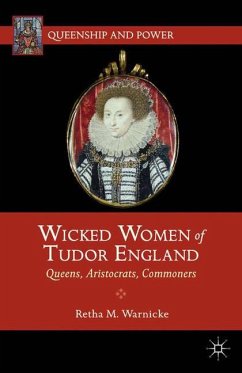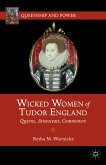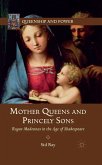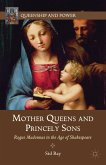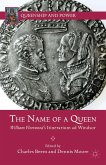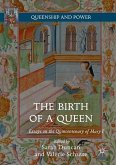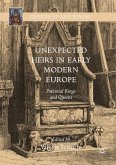This fascinating study delves into the lives of six Tudor women celebrated for their reputed wickedness. Collected here are accounts of Anne Boleyn, Katherine Howard, Anne Seymour, Lettice Dudley, and Jane and Alice More. Warnicke rescues these women from historical misrepresentations and helps us to rediscover the complex world of Tudor society.
"Warnicke succeeds admirably in her aim to provide more careful assessments of these women. One of the strengths of her monograph is her astute scrutiny of the limitations of the evidence used to malign these women, albeit some chapters are more compelling than others. Her monograph offers a valuable reassessment of women like Anne Seymour, Lettice Dudley, and Alice More and ought to encourage more careful study of their careers. While Tudor historians may not agree with her conclusions, Warnicke's text offers a thorough and insightful study that is a valuable addition to scholarship on queenship, political power, and gender in early modern England." Journal of British Studies
"Retha Warnicke's Wicked Women of Tudor England corrects 500 years of historiography on six early modern English women, two queens, two aristocrats, and two commoners. All six are labeled wicked by their contemporaries. As Warnicke's research attests, however, these judgments have very little to do with their actions, but are fueled by a desire either to attack or to praise their husbands and are largely the result of early modern rumormongering . . . Warnicke's methodology should be taken as a model for future scholarship, as she cogently substantiates the biases and inaccuracies informing these women's historical reputations - in past and present writings - through her sensitive reconsideration of all known sources. While the book is intended for a scholarly audience, its prose is accessible and clear. It serves as necessary reading for anyone wishing to understand more about early modern attitudes toward gender, expectations of women's behavior, and the early modern culture of gossip." - Renaissance Quarterly
"Wicked Women of Tudor England: Queens, Aristocrats, Commoners is an ideal book for readers of history or Tudor historical fiction looking to separate reliable evidence from innuendo in the biographies of these six notorious sixteenth century women. Warnicke provides convincing evidence that none of the women she discusses were actually wicked but found their reputations under scrutiny because they married politically controversial husbands." - The Royal Historian
"This book is a fascinating window into the social and cultural world of the early modern women and a model of rigorous and impeccable research. Warnicke does not leave a stone unturned in her attention to previous scholarship from the early modern period to the present; she examines every bit of relevant evidence that bears on the specific subject at hand; and she consistently contextualizes the evidence for the readers who may be less familiar with early modern social, cultural, and political practices. Moreover, Warnicke makes her methodology clear throughout so the book additionally serves as an example of how history should be done: without prejudice or preconceived notions, with great attention to accuracy, and with an understanding of historical context." - Jo Carney, Associate Professor, Department of English, The College of New Jersey, USA
"This book's insights into the lives of interesting women, some of whom remain on the periphery of knowledge, is a definite strength. Another of the book's many strengths is the impressive amount of archival work, examining governmental records, legal documents, and diplomatic dispatches, supplemented by an extensive review of biographies and literary works to investigate how the reputations of these women have developed and evolved over a period of time. The quality of the research pulls together information not readily available while serving as a corrective for misinformation that has been treated as accurate and repeated again and again as such." - Debra Barrett-Graves, professor, Department of English, California State University, East Bay, USA
"Retha Warnicke's Wicked Women of Tudor England corrects 500 years of historiography on six early modern English women, two queens, two aristocrats, and two commoners. All six are labeled wicked by their contemporaries. As Warnicke's research attests, however, these judgments have very little to do with their actions, but are fueled by a desire either to attack or to praise their husbands and are largely the result of early modern rumormongering . . . Warnicke's methodology should be taken as a model for future scholarship, as she cogently substantiates the biases and inaccuracies informing these women's historical reputations - in past and present writings - through her sensitive reconsideration of all known sources. While the book is intended for a scholarly audience, its prose is accessible and clear. It serves as necessary reading for anyone wishing to understand more about early modern attitudes toward gender, expectations of women's behavior, and the early modern culture of gossip." - Renaissance Quarterly
"Wicked Women of Tudor England: Queens, Aristocrats, Commoners is an ideal book for readers of history or Tudor historical fiction looking to separate reliable evidence from innuendo in the biographies of these six notorious sixteenth century women. Warnicke provides convincing evidence that none of the women she discusses were actually wicked but found their reputations under scrutiny because they married politically controversial husbands." - The Royal Historian
"This book is a fascinating window into the social and cultural world of the early modern women and a model of rigorous and impeccable research. Warnicke does not leave a stone unturned in her attention to previous scholarship from the early modern period to the present; she examines every bit of relevant evidence that bears on the specific subject at hand; and she consistently contextualizes the evidence for the readers who may be less familiar with early modern social, cultural, and political practices. Moreover, Warnicke makes her methodology clear throughout so the book additionally serves as an example of how history should be done: without prejudice or preconceived notions, with great attention to accuracy, and with an understanding of historical context." - Jo Carney, Associate Professor, Department of English, The College of New Jersey, USA
"This book's insights into the lives of interesting women, some of whom remain on the periphery of knowledge, is a definite strength. Another of the book's many strengths is the impressive amount of archival work, examining governmental records, legal documents, and diplomatic dispatches, supplemented by an extensive review of biographies and literary works to investigate how the reputations of these women have developed and evolved over a period of time. The quality of the research pulls together information not readily available while serving as a corrective for misinformation that has been treated as accurate and repeated again and again as such." - Debra Barrett-Graves, professor, Department of English, California State University, East Bay, USA
"Retha Warnicke's Wicked Women of Tudor England corrects 500 years of historiography on six early modern English women, two queens, two aristocrats, and two commoners. All six are labeled wicked by their contemporaries. As Warnicke's research attests, however, these judgments have very little to do with their actions, but are fueled by a desire either to attack or to praise their husbands and are largely the result of early modern rumormongering . . . Warnicke's methodology should be taken as a model for future scholarship, as she cogently substantiates the biases and inaccuracies informing these women's historical reputations - in past and present writings - through her sensitive reconsideration of all known sources. While the book is intended for a scholarly audience, its prose is accessible and clear. It serves as necessary reading for anyone wishing to understand more about early modern attitudes toward gender, expectations of women's behavior, and the early modern culture of gossip." - Renaissance Quarterly "Wicked Women of Tudor England: Queens, Aristocrats, Commoners is an ideal book for readers of history or Tudor historical fiction looking to separate reliable evidence from innuendo in the biographies of these six notorious sixteenth century women. Warnicke provides convincing evidence that none of the women she discusses were actually wicked but found their reputations under scrutiny because they married politically controversial husbands." - The Royal Historian "This book is a fascinating window into the social and cultural world of the early modern women and a model of rigorous and impeccable research. Warnicke does not leave a stone unturned in her attention to previous scholarship from the early modern period to the present; she examines every bit of relevant evidence that bears on the specific subject at hand; and she consistently contextualizes the evidence for the readers who may be less familiar with early modern social, cultural, and political practices. Moreover, Warnicke makes her methodology clear throughout so the book additionally serves as an example of how history should be done: without prejudice or preconceived notions, with great attention to accuracy, and with an understanding of historical context." - Jo Carney, Associate Professor, Department of English, The College of New Jersey, USA "This book's insights into the lives of interesting women, some of whom remain on the periphery of knowledge, is a definite strength. Another of the book's many strengths is the impressive amount of archival work, examining governmental records, legal documents, and diplomatic dispatches, supplemented by an extensive review of biographies and literary works to investigate how the reputations of these women have developed and evolved over a period of time. The quality of the research pulls together information not readily available while serving as a corrective for misinformation that has been treated as accurate and repeated again and again as such." - Debra Barrett-Graves, professor, Department of English, California State University, East Bay, USA

